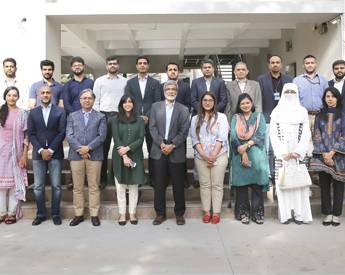
A recent report by Institute for Business Administration (IBA) Karachi has assessed economic climate vis a vis social distancing measures, spiking inflation, poverty and unemployment which are only fanning the fears of worst to come- a global recession. Such a deteriorating economic trajectory caused by the outbreak of COVID-19 presents an inflection point in Pakistan.
As per economic outlook, sell off pressure was observed during the past three weeks as cautious foreigners offloaded more than Rs 200 billion of securities, an alarming capital outflow driven by lower investor confidence.
Even before the coronavirus struck, Pakistan’s economy was crumbling. Expectations of significantly higher unemployment and poverty and considerably lower GDP growth for FY20 are now certain.
The Sindh Government has been proactive and leading in terms of implementing policies regarding social distancing after 15 March 2020. With the help of Sindh govt’ actions on prevention, an index of social distancing from very low to high has been developed to assess the impact of staged lockdown. What measure of social distancing is more effective is the question for new research.
Relief package is not enough
Although the supply chain has not been that badly affected, the recent hoarding behavior by the people has created supply and demand issues and price hike. Despite the government’s Rs 1.2 trillion relief package announced on 24 March, there are many concerns about targeting and its efficacy. How will the non-waged, daily workers, of the informal sector who make up most of Pakistan’s work force benefit? There are fears of elite capture and government failure in all government initiatives. BISP leakage episode is still intact in citizens' minds.
.Fears of global recession?
At this point, there are no credible indices to forecast future economic impact. However, signals from global financial markets present a bleak picture. Volatility in the global stock markets has signaled the greatest strain, after the global financial crisis of 2008. Of the nine countries that are severely affected by COVID-19, the IBA study finds a negative relationship between the number of COVID-19 cases and stock market performance. Though the signals may be misleading, the recessionary risk is real. The vulnerability of major economies has risen as growth has slowed and the question surrounds: can they absorb shocks?
The lockdowns are affecting states and markets, no doubt, and the pandemic is devastating. However, the AQI figures show environment of major cities healing of pollutants caused by industrial waste.
As per economic outlook, sell off pressure was observed during the past three weeks as cautious foreigners offloaded more than Rs 200 billion of securities, an alarming capital outflow driven by lower investor confidence.
Even before the coronavirus struck, Pakistan’s economy was crumbling. Expectations of significantly higher unemployment and poverty and considerably lower GDP growth for FY20 are now certain.
| GDP Growth | Unemployment in Sindh (Millions) |
| Low (0%-1.5%) - massive recession | 0.61 |
| Medium (1.5%-2.5%)- mild recession | 0.29 |
| High (2.5%-3.5%) - | 0.16 |
The Sindh Government has been proactive and leading in terms of implementing policies regarding social distancing after 15 March 2020. With the help of Sindh govt’ actions on prevention, an index of social distancing from very low to high has been developed to assess the impact of staged lockdown. What measure of social distancing is more effective is the question for new research.
Relief package is not enough
Although the supply chain has not been that badly affected, the recent hoarding behavior by the people has created supply and demand issues and price hike. Despite the government’s Rs 1.2 trillion relief package announced on 24 March, there are many concerns about targeting and its efficacy. How will the non-waged, daily workers, of the informal sector who make up most of Pakistan’s work force benefit? There are fears of elite capture and government failure in all government initiatives. BISP leakage episode is still intact in citizens' minds.
.Fears of global recession?
At this point, there are no credible indices to forecast future economic impact. However, signals from global financial markets present a bleak picture. Volatility in the global stock markets has signaled the greatest strain, after the global financial crisis of 2008. Of the nine countries that are severely affected by COVID-19, the IBA study finds a negative relationship between the number of COVID-19 cases and stock market performance. Though the signals may be misleading, the recessionary risk is real. The vulnerability of major economies has risen as growth has slowed and the question surrounds: can they absorb shocks?
The lockdowns are affecting states and markets, no doubt, and the pandemic is devastating. However, the AQI figures show environment of major cities healing of pollutants caused by industrial waste.
